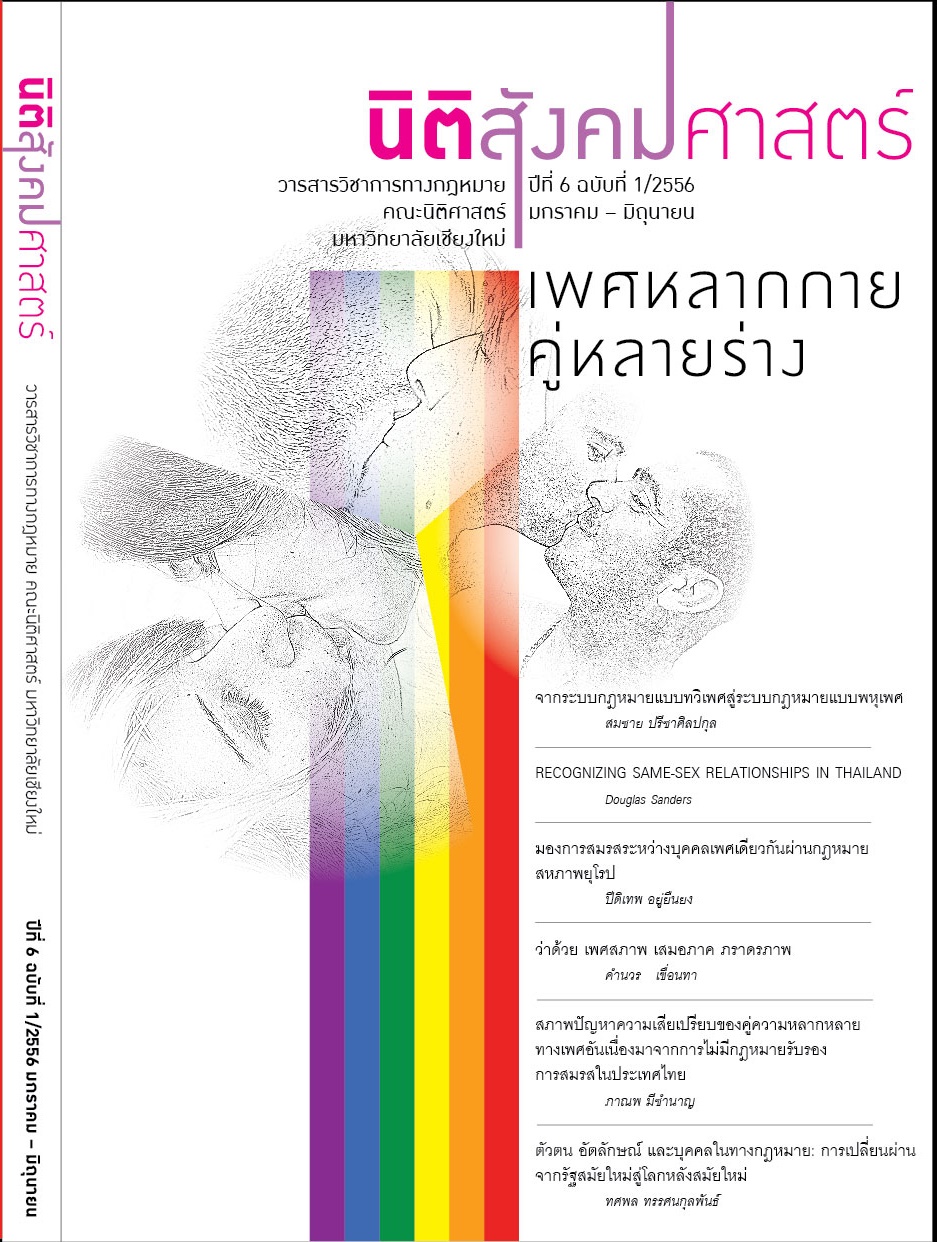มองการสมรสระหว่างบุคคลเพศเดียวกันผ่านกฎหมายสหภาพยุโรป
Main Article Content
บทคัดย่อ
บทคัดย่อ
กฎหมายสหภาพยุโรปในปัจจุบันไม่ได้กำหนดหลักเกณฑ์เกี่ยวกับการสมรสระหว่างบุคคลเพศเดียวกันเอาไว้ โดยการสมรสระหว่างบุคคลเพศเดียวกันไม่ได้ถูกระบุเอาไว้ในเขตอำนาจสหภาพยุโรป แม้ว่าอนุสัญญาว่าด้วยสิทธิมนุษยชนยุโรป ค.ศ. 1950 มาตรา 8 มาตรา 12 และมาตรา 14 ได้วางหลักการเกี่ยวกับสิทธิพื้นฐานและความเท่าเทียมในระดับสหภาพยุโรป ดังเช่น สิทธิที่จะได้รับการเคารพความเป็นอยู่ส่วนตัวและชีวิตครอบครัว สิทธิในการแต่งงานและการห้ามเลือกปฏิบัติ ในทางตรงกันข้าม กฎหมายสหภาพยุโรปกลับไม่ได้กำหนดมาตรการเฉพาะให้รัฐสมาชิกยอมรับการสมรสระหว่างบุคคลเพศเดียวกันว่าเป็นการกระทำที่ชอบด้วยกฎหมายหรือมีกฎหมายรับรองไว้ อนึ่ง แม้ว่ารัฐสมาชิกสหภาพยุโรปควรปฏิบัติต่อการสมรสระหว่างบุคคลต่างเพศและการสมรสระหว่างบุคคลเพศเดียวกันอย่างเท่าเทียม แต่สิทธิของคู่สมรสเพศเดียวกันที่จะทำการสมรสย่อมขึ้นอยู่กับหลักเกณฑ์ทางกฎหมายภายในที่รัฐสมาชิกแต่ละรัฐได้กำหนดไว้และเงื่อนไขตามกฎหมายสหภาพยุโรปบางฉบับว่าด้วยเรื่องเสรีภาพในการโยกย้ายถิ่นฐาน การโยกย้ายถิ่นที่อยู่ การอพยพและการลี้ภัยได้บัญญัติเอาไว้ ด้วยเหตุนี้เอง ข้อบังคับสหภาพยุโรปว่าด้วยการสมรสระหว่างบุคคลเพศเดียวกันจึงควรถูกบัญญัติขึ้นเป็นการเฉพาะโดยสหภาพยุโรป ในทางเดียวกัน ความสัมพันธ์ระหว่างบุคคลเพศเดียวกันและการจดทะเบียนชีวิตคู่ของบุคคลเพศเดียวกันก็ควรได้รับการบัญญัติเป็นกฎหมายภายในประเทศของรัฐสมาชิกสหภาพยุโรปแต่ละรัฐ
Abstract
The current EU legal frameworks do not fully apply to same-sex marriages and registered partnerships. Same-sex marriage is not a legal status recognised in all European Union (EU) jurisdictions. Even thought article 8, article 12 and article 14 of the European Convention on Human Rights 1950 provide the fundamental rights and equality applicable at EU level, such as the right to respect for private and family life, the right to marry and the prohibition of discrimination. However, the EU legal frameworks do not specifically oblige EU Member States to allow or recognise same-sex partnerships or marriages although they generally oblige Member States to treat same-sex couples equally to opposite sex couples when they are applying the EU law. The rights of same-sex couples depend upon their relation to the EU Member States and legal conditions of the EU laws relating to free movement, migration and asylum. EU framework for the legal recognition of same-sex couples, therefore, should be established by the EU's legislative body. Likewise, legal recognition of same-sex relationships and registered partnership recognition to same-sex couples in the domestic laws should be legally introduced by all EU Member States.
DOI: http://dx.doi.org/10.14456/cmujlss.2013.9
Article Details
O ความคิดเห็นใดๆ ที่ลงตีพิมพ์ใน CMU Journal of Law and Social Sciences เป็นของผู้เขียน (ความคิดเห็นใดๆ ของผู้เขียน กองบรรณาธิการ CMU Journal of Law and Social Sciences ไม่จำเป็นต้องเห็นด้วย)
O กองบรรณาธิการ CMU Journal of Law and Social Sciences ไม่สงวนสิทธิ์ในการคัดลอกแต่ให้อ้างอิงแหล่งที่มาด้วย
เอกสารอ้างอิง
หนังสือ
Anderson, B. (1996). Imagined Communities Reflections on the Origin and Spread of Nationalism. (7th ed.). London: Verso. p. 224.
Antokolskaia, M. (2012). ‘Family Law and National Culture: Arguing against the cultural constraints argument’ in Boele-Woelki, K. & Fuchs, A. (ed.), Legal Recognition of Same-Sex Relationships in European National, Cross-Border and European Perspectives. Cambridge: Intersentia Publishing, p 48.
Bachmann, C. & Staerklé, C. (2003). The meanings of citizenship: from status to social process, in Re-inventing citizenship in South-Caucasus: exploring the dynamics and contradictions between formal definitions and popular conceptions, Final research report JRP 7AZPJ062373, SCOPES: Scientific Co-operation between Eastern Europe and Switzerland Swiss National Science Foundation, , Geneva:
CIMERA and University of Geneva, pp. 14-24.
Carrera, S. & Atger, A. F. (2009). Implementation of Directive 2004/38 in the context of EU Enlargement A proliferation of different forms of citizenship? CEPS Special Report/April 2009. Brussels: Centre for European Policy Studies, p5.
European Commission Directorate-General Justice. (2010). Freedom to move and live in Europe A Guide to your rights as an EU citizen. Brussels: European Commission Directorate-General Justice, p 5.
European Union Agency for Fundamental Rights. (2009). Grounds of Sexual Orientation in the EU Member States Part I – Legal Analysis. Vienna: European Union Agency for Fundamental Rights, pp. 103-106.
European Union Agency for Fundamental Rights. (2009). Same-Sex Couples, Free Movement of EU citizens, Migration and Asylum. Vienna: European Union Agency for Fundamental Rights, p 2.
วารสาร
Allen. D. W. (2006). ‘An Economic Assessment of Same-Sex Marriage Laws’, Harvard Journal of Law & Public Policy, 3 (29), 949-980.
Bamforth, N. (2007). ‘Families but (yet) marriage? Same-sex partners and the developing European convention “margin of appreciation”, Child and Family Law Quarterly, 23 (1), 128 – 43.
Berkowitz, D. & Marsiglio, W. (2007). ‘Gay Men: Negotiating Procreative, Father, and Family Identities’, Journal of Marriage and Family, 69 (2), 366–381.
Carolan, D. (2005). ‘Judicial Impediments to Legislating Equality for Same-Sex Couples in the European Union’, Tulsa Law Review, 40 (3), 527-560.
Geffin, M. (2013). ‘Same-sex marriage conventional marriage should have equality rights’. Legal Week, 15 (8), 13.
Hewitt, J. P. & Shulman, D. (1991). Self and Society: A Symbolic Interactionist Social Psychology. (5th ed.). Massachusetts: Pearson - Allyn & Bacon, p 5.
Spencer, K. (2010). ‘Same sex couples and the Right to Marry – European perspectives’, Cambridge Student Law Review, 6 (1), 155-176.
Stott, D. (2007). ‘Whether non-recognition of same-sex partnerships as marriages contravened Article 8 or 12 of the European Convention on Human Rights 1950’, Student Law Review, 50 (Spr), 2-3.
สื่ออีเล็กทรอนิกส์
Alliance Européenne des Mouvements Nationaux Tous droits réservés. (2013). “Just Married” – Or is it just a ploy?. Retrieved May 13, 2013, from http://aemn.eu/2013/04/18/just-married-or-ploy/
BBC News World. (2013). Gay marriage around the world. Retrieved May 13, 2013, from http://www.bbc.co.uk/news/world-21321731
Blumer, H. (1969). Symbolic Interactionism: Perspective and Method. Berkeley: University of California Press, pp 1-60. Retrieved May 10, 2013, from https://campus.fsu.edu/bbcswebdav/institution/academic/social_sciences/sociology/Reading%20Lists/Social%20Psych%20Prelim%20Readings/I.%20Classics/1969%20Blumer%20-%20Symbolic%20Interactionism.pdf
Europa Summaries of EU legislation. (2007). Equal treatment in employment and occupation. Retrieved May 15, 2013, from http://europa.eu/legislation_summaries/employment_and_social_policy/employment_rights_and_work_
organisation/c10823_en.htm
Europa Summaries of EU legislation. (2009). Right of Union citizens and their family members to move and reside freely within the territory of the Member States. Retrieved May 12, 2013, from http://europa.eu/legislation_summaries/internal_market/living_and_working_in_the_internal_market/l33152_en.htm
Europa Summaries of EU legislation. (2011). Family reunification. Retrieved May 11, 2013, from http://europa.eu/legislation_summaries/justice_freedom_security/free_movement_of_persons_asylum_immigration/l33118_en.htm
European Agency for Safety and Health at Work. (2013). Directive 2006/54/EC -equal opportunities. Retrieved May 15, 2013, from https://osha.europa.eu/en/legislation/directives/sector-specific-and-worker-related-provisions/osh-relatedaspects/council-directive-2006-54-ec
European Commission. (2012). Family reunification: The right to family reunification, recognised throughout the EU. Retrieved May 11, 2013, from http://ec.europa.eu/dgs/home-affairs/what-we-do/policies/immigration/family-reunification/index_en.htm
European Court of Human Rights. (2013). European Convention on Human Rights. Strasbourg: European Court of Human Rights & Council of Europe, p 12. Retrieved May 8, 2013, from http://www.echr.coe.int/NR/rdonlyres/D5CC24A7-DC13-4318-B457-5C9014916D7A/0/Convention_ENG.pdf
European Court of Human Rights. (2013). Factsheet - Sexual Orientation Issues. Retrieved May 15, 2013, from http://www.echr.coe.int/NR/rdonlyres/4240E98C-43FB-4EE0-A85F-66DA483E08EA/0/FICHES_Orientation_sexuelle_EN.pdf
Secretariat of Equinet. (2012). EU legislative framework. Retrieved May 8, 2013, from http://www.equineteurope.org/-Legislative-framework,82-Staver, A. (2008). Working Paper Series No.51 Family Reunification: A Right for Forced Migrants?. Oxford: Oxford Department of International Development, University of Oxford, p 12, Retrieved May 11, 2013, from http://www.rsc.ox.ac.uk/publications/working-papers-folder_contents/RSCworkingpaper51.pdf

